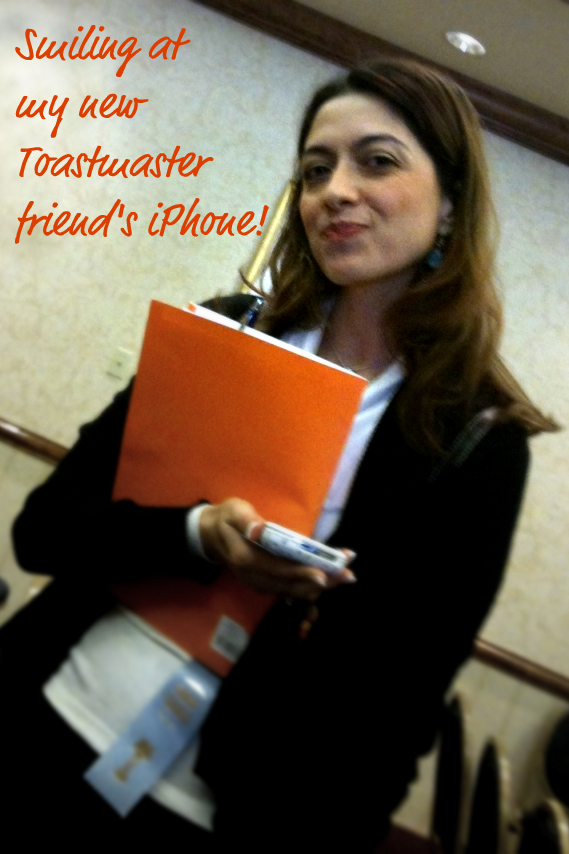 For the last 3 weeks, I have focused on little else other than the upcoming speech at Blogworld. It was an honor to be accepted, after submitting this video proposal. As with all things, however, after the excitement calms down and the dust settles, you are left with real work to do and in this case, I was looking at an hour-long speech to write and deliver. Even with the experience of Toastmasters (video proof!) and a few other public speaking events, the idea of writing for and speaking at Blogworld has been pushing me to break new boundaries in speech preparation. [Read more…] about 17 Effective Tips on Speech Writing and Delivery
For the last 3 weeks, I have focused on little else other than the upcoming speech at Blogworld. It was an honor to be accepted, after submitting this video proposal. As with all things, however, after the excitement calms down and the dust settles, you are left with real work to do and in this case, I was looking at an hour-long speech to write and deliver. Even with the experience of Toastmasters (video proof!) and a few other public speaking events, the idea of writing for and speaking at Blogworld has been pushing me to break new boundaries in speech preparation. [Read more…] about 17 Effective Tips on Speech Writing and Delivery
Toastmasters
Making Tough Decisions: How to Break a Commitment Professionally

“We can do anything but we can’t do everything.”
I used to believe I can do everything! By everything I mean my growing list of passions and aspirations from which responsibilities and commitments are naturally born. By doing I mean doing well, extremely well. It is either a job well done or a job not done at all, as far as I am concerned because my reputation is on the line. A few weeks ago, I realized I live in my own happy bubble of wonderland where my days are endless, my time immeasurable and my body an infinite source of energy. Then I woke up and I had to make a very tough decision.
Wisdom tells us doing fewer things but doing each remarkably well will fare better in the end for us but how do we get out of the commitments that are already made? [Read more…] about Making Tough Decisions: How to Break a Commitment Professionally
Extemporaneous Speaking: Fast thoughts on Motivation
Extemporaneous Speaking will give you a second thought about becoming that professional speaker!
In the pursuit of our goals, it is inevitable that on every path, we will encounter a beast we would rather avoid. I call it a beast. In nice business language, it is called a challenge, and you may have other names for it!
No matter, it is the necessary evil in achieving the goals for which we strive. It is the thing we would rather avoid and still somehow secretly wish to be allowed to reach our target. Everyone has them. For me, it is doing strenuous abdominal training in order to develop a strong enough core to do my dream yoga poses. Or talking French to Parisians with risk of much embarrassment in order to finally someday master a language I adore. And in the pursuit of becoming a professional speaker, it is the thought of extemporaneous speaking on any given topic which I would rather avoid at any cost.
[Read more…] about Extemporaneous Speaking: Fast thoughts on Motivation
The 3 Best Things I learned from watching Toastmasters Speech Contestants

On November 6th and 7th, I attended my first Toastmasters Conference to support and cheer the contestants. It was the District 37 Conference in the mountains of Asheville, North Carolina. One of the best parts and motivators was the drive and rooming with a fellow Toastmaster who is also a dear friend and on this particular occasion, a contestant of a humorous speech competition. That’s right, the heart of the conference is the two Fall competitions – The Humorous Speech Competition and the Evaluation Competition. The top 16 speakers in all from the entire NC District, each of whom have won every level of competition from Club to Area to Division in their region, compete in the much awaited District competitions. The caliber of speakers is high, and the air is filled with anticipation for the audience and anxiety for the speakers. And after watching these competitions, I now know why.
[Read more…] about The 3 Best Things I learned from watching Toastmasters Speech Contestants
Delivering Solid Evaluations at Toastmasters
If you are part of Toastmasters, you already know what I am about to say. Toastmasters Contests are a big part of what happens on a year basis and the Evaluation Contest is when a target speech is selected and the contestants each evaluate that speech.
In this post, I wanted to outline an effective approach to providing evaluations to speakers. This method first reassures the speaker of their strengths and then inspires them to push the envelope on those skills. Providing that perfect balance of critique is the challenging task of a great evaluator. Remember you do not create the speech, and may have no familiarity with the topic at hand when you are asked to evaluate, you are also given no time to rehearse or practice your speech in advance. Evaluations are a type of impromptu speaking with a focus on what the speaker did well and what they could improve upon.
Tips on providing strong evaluations to a speaker:
1. Listen and Watch the speaker with Great Attention: Yes, that seems a very obvious tip but one worth noting. It is possible to forget your role when the agenda shows your speaker as the last to speak, and generally, no one will prompt the evaluator again. Paying attention and observing the speaker from all angles and aspects is your most critical role as an evaluator
2. Always start on a High Note: Always start your evaluation with praise. Always without an exception. When you think about the widespread fear of public speaking, it should serve as a reminder that regardless of the speaker’s performance, it takes courage and preparation and effort to deliver a speech, and for that, a praise is note-worthy.
You can try either a format of good-bad-good or good-bad-good-bad-….- good, always starting and ending on a high note. In general, all evaluations should start on a high note. While you can easily provide the same exact information by delivering good-bad or bad-good, the outcome of the first far exceeds the latter and order matters here.
3.Balance the feedback on the positive: I can be the harshest critique, for me and for all those who wish me to give them the straight scoop. But I have learned at Toastmasters that delivering an evaluation that is heavy on the “do things better” side rather than “you did well side” will sadly not have the intended effect. One thing to consider is your level of club. We have an Advanced club and it is expected that evaluations be tough and growth-inducing for the speaker. In a beginner club, you may need to exercise far more sensitivity in the number of tips you dispense relative to the amount of praise, at least until the confidence of speaker is built. So heavy on the positive notes. These can be small details, or generic statements as long as they apply to what the speaker did.
4. Demonstrating your points clearly: You may have a lot of good advice on what the speaker can do to improve. It would be of little value if they do not understand the advice with utter clarity. This happens a lot because we may assume the speaker knows well how they were perceived in the audience and jump right to why that should have been different. Instead, try this 3-pronged approach:
~ Clearly explain your impression of what the speaker did or intended to do
~ Describe what could be done differently in that exact situation
~ Explain why this suggestion will have more effective result for the speaker
For instance, if they pace the floor, (1) I demonstrated the pace, (2) next, I mentioned why it was ineffective – because it distracted us from listening to her- and (3) last, I suggested what could be done more effectively (a more purposeful walking of the room and addressing the audience).
5. Delivering the Evaluation Poised as a Role Model for Speaker: It is easy to forget that because you are evaluating someone else, you can let some of your own good speaking form slide. Remember, even giving an evaluation is a speech. You are addressing an audience, and you are claiming to know how a good speaker ought to present herself. To that point, remember all your public speaking tools:
Speak clearly.
Use no filler words.
Have a great posture.
Smile and be pleasant.
Enunciate your words clearly.
Address the audience.
Address the Speaker often.
Use gestures effectively.
Use correct pronunciation and grammar.
Finish strong and on a high note.
Enjoy the process. Feedback is MOST appreciated when it’s sincere and honest
 I am Farnoosh, the founder of Prolific Living. So glad you are here. My mission is to empower you to unblock your creative genius to live your dream life.
I am Farnoosh, the founder of Prolific Living. So glad you are here. My mission is to empower you to unblock your creative genius to live your dream life.